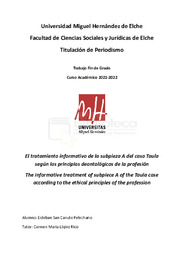Please use this identifier to cite or link to this item:
https://hdl.handle.net/11000/28709Full metadata record
| DC Field | Value | Language |
|---|---|---|
| dc.contributor.advisor | López Rico, Carmen María | - |
| dc.contributor.author | San Canuto Pelechano, Esteban | - |
| dc.contributor.other | Departamentos de la UMH::Ciencias Sociales y Humanas | es_ES |
| dc.date.accessioned | 2022-12-22T09:07:55Z | - |
| dc.date.available | 2022-12-22T09:07:55Z | - |
| dc.date.created | 2022-09 | - |
| dc.identifier.uri | https://hdl.handle.net/11000/28709 | - |
| dc.description.abstract | La libertad de expresión y de información son derechos fundamentales de los ciudadanos. Ambos nos permiten estar en igualdad de condiciones respecto a otros miembros. La creación de opinión, de un pensamiento crítico, la formación de argumentos y la lucha contra las desigualdades sociales y económicas, son solo algunos de los objetivos del derecho a recibir información y a expresarnos. Para el profesional que se dedica a trabajar diariamente con la actualidad estos derechos son más que necesarios. Pero, en infinidad de ocasiones, se ven enfrentados con el respeto a la presunción de inocencia, el derecho al honor, a la intimidad personal y familiar y a la propia imagen. No es extraño que, en determinados medios de comunicación con el pretexto de informar a la ciudadanía y amparándose en el derecho a la libertad de expresión de los periodistas, se publiquen informaciones que no respetan estos mínimos. En la subpieza A de la trama de corrupción política Taula estuvo implicada la exalcaldesa de Valencia, Rita Barberá, y los concejales del mismo grupo. Desde el Partido Popular de la Comunidad Valenciana, numerosos miembros han acusado directamente a los medios de comunicación de no respetar los tiempos de la justicia, de adelantarse a los acontecimientos y de crear juicios paralelos que han vulnerado la presunción de inocencia de estas personas. El siguiente trabajo pretende discernir y aclarar si los medios de comunicación actuaron siguiendo los principales códigos éticos y si se respetó la presunción de inocencia, el derecho al honor, la intimidad personal y familiar y la propia imagen de los acusados. El resultado de dicha investigación deriva en un reportaje audiovisual, que cumple con los requisitos de calidad informativa, técnica y visual. | es_ES |
| dc.description.abstract | Freedom of expression and information are fundamental rights of citizens. Both allow us to be on equal terms with other members. The creation of opinion, of critical thinking, the formation of arguments and the fight against social and economic inequalities, are just some of the objectives of the right to express ourselves and receive information freely. For the professional who works daily with current affairs, these rights are more than necessary. But, on countless occasions, they are confronted with respect for the presumption of innocence, the right to honour, personal and family privacy and their own image. It is not strange that, in certain communication media, under the pretext of informing the public and, under cover of the right to freedom of expression of journalists, information is published that does not respect these minimums. In piece A of the Taula political corruption plot, the former mayor of Valencia Rita Barberá and the councilors of the same corporation and group were involved. From the Popular Party of the Valencian Community, there have been numerous members who have directly accused the media of not respecting the times of justice, of anticipating events and of "the need to avoid parallel trials that violate the presumption of innocence”, as stated by the current councilor and spokesperson for the PP in the Valencia City Council, María José Catalá. The following work aims to discern and clarify if the media acted following the main ethical codes and if the presumption of innocence, the right to honor, personal and family privacy of the accused were respected. The result of this investigation derives in an audiovisual report, which meets the requirements of informative, technical and visual quality. | es_ES |
| dc.format | application/pdf | es_ES |
| dc.format.extent | 52 | es_ES |
| dc.language.iso | spa | es_ES |
| dc.publisher | Universidad Miguel Hernández de Elche | es_ES |
| dc.rights | info:eu-repo/semantics/openAccess | es_ES |
| dc.rights | Attribution-NonCommercial-NoDerivatives 4.0 Internacional | * |
| dc.rights.uri | http://creativecommons.org/licenses/by-nc-nd/4.0/ | * |
| dc.subject | Rita Barberá | es_ES |
| dc.subject | presunción de inocencia | es_ES |
| dc.subject | derecho a la libertad de expresión | es_ES |
| dc.subject | derecho al honor | es_ES |
| dc.subject | intimidad personal | es_ES |
| dc.subject | presumption of innocence | es_ES |
| dc.subject | right to freedom of expression | es_ES |
| dc.subject | right to honor | es_ES |
| dc.subject | personal privacy | es_ES |
| dc.subject.other | CDU::0 - Generalidades.::070 - Periódicos. Prensa. Periodismo. Ciencias de la información | es_ES |
| dc.title | El tratamiento informativo de la subpieza A del caso Taula según los principios deontológicos de la profesión | es_ES |
| dc.title.alternative | The informative treatment of subpiece A of the Taula case according to the ethical principles of the profession | es_ES |
| dc.type | info:eu-repo/semantics/bachelorThesis | es_ES |

View/Open:
TFG-San Canuto Pelechano, Esteban.pdf
4,61 MB
Adobe PDF
Share:
.png)
